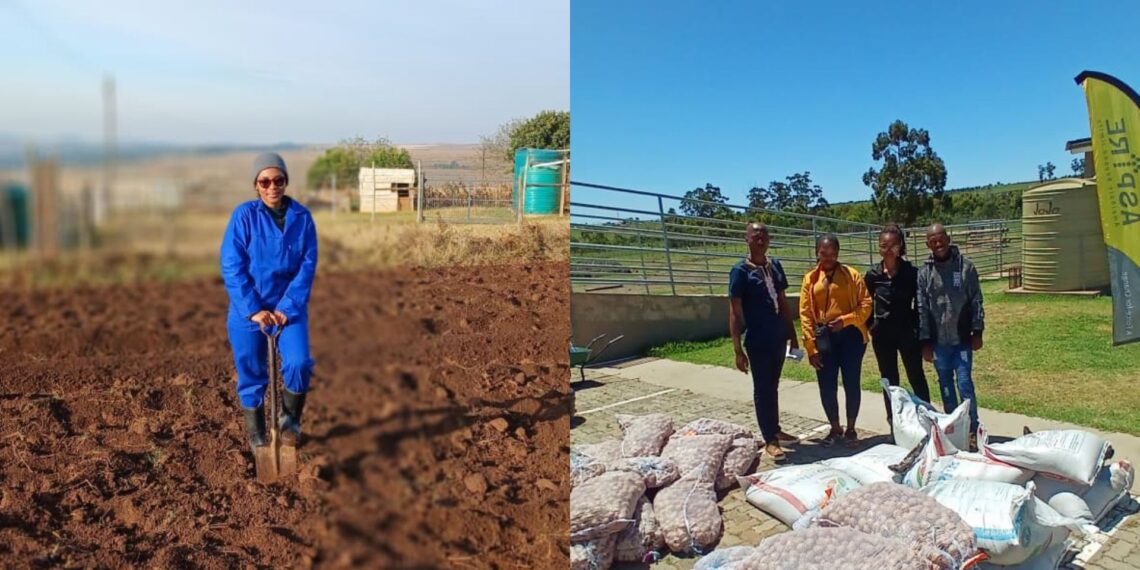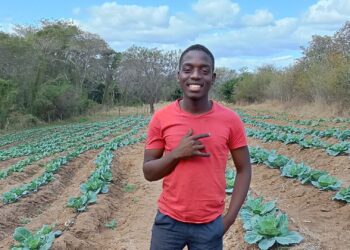Born with a desire to help people, Novoti Jiya found her calling not in an office, but on the land of her ancestors. After a series of setbacks, she started Taleni Farmers Co-operative, transforming her passion for community and sustainable agriculture into a business.
Jiya, from kuGatyane in the Eastern Cape, always knew she wanted to work with people and make a meaningful impact, but the path wasn’t clear. To find her direction, she initially enrolled in public management at Walter Sisulu University.
It was only later, however, that she realised her true passion was to work directly with communities in an outdoor setting. This discovery inspired her to create Taleni Farmers Co-operative.
Farming lessons from childhood
Her passion for farming was unknowingly seeded in childhood. Inspired by her father, who was a farmer mainly focused on a food garden, Jiya and her siblings learnt the ropes from an early age. She says they were taught practical skills such as making seedbeds, planting seedlings, and maintaining crops.
She fondly remembers her father working with maize and livestock, yet farming was never something she pictured for herself. “I just didn’t see it then,” Jiya shares with Food For Mzansi.
It was only years later, after completing her tertiary education, that she began to view farming through a different lens — one that drew her closer to the land she once overlooked.
“I always saw myself in a field that helped people, but I didn’t know exactly what form that would take,” she says.
After completing matric, she enrolled at Walter Sisulu University’s Potsdam Campus, where she studied public management from 2012 to 2015. In 2016, she completed her internship in supply chain management at the department of rural development and agrarian reform in East London.
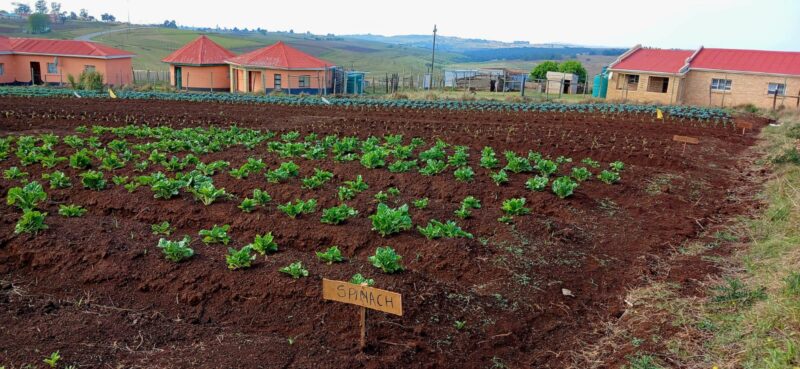
Although the internship gave her work experience, it also left her questioning her path. She adds, “I was not fulfilled. I am a very energetic person who loves being active, and that experience started to feel like a trap.”
After completing her internship, she returned to her village, Taleni, in Willowvale. Back home, she reflected on what would bring her joy and purpose. She felt she needed to do something to fill the void she had experienced during her internship.
The following year, she took a bold step and started farming in her back garden with zero capital, beginning with potatoes. Unfortunately, she says all of it went to waste due to a severe drought.
Related stories
- Limpopo teen farmer finds purpose and passion in the fields
- The farmer’s guide to supplying fresh produce to markets
Holding on to farming dreams
Despite the setback, Jiya did not give up. The following year, she planted potatoes again with hope and faith, this time adding spinach and cabbage. The yield improved, and she began forming a small client base, mainly from her village and nearby communities. However, she still could not meet demand because she only had about half a hectare to plant on.
By 2020, farming was still a struggle. She recalls that the hardest part was pushing a wheelbarrow to fetch water from a river nearly five kilometres away just to irrigate her crops.
“It was such a horrible experience, but I wanted to farm with all of myself, so I did that until the rain finally came,” she says.
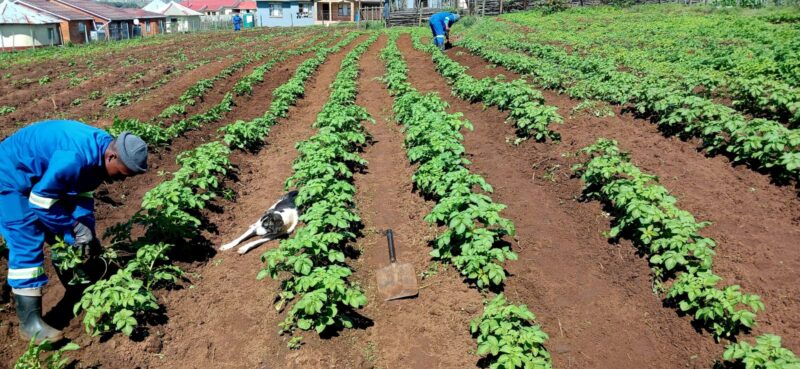
To grow her business, Jiya used the R1 000 allowance she received from her father, sacrificing it to buy seedlings, cover tractor costs, and purchase pest control chemicals. “Farming is hard without proper tools, equipment and water harvesting methods.”
There were also moments of heartbreak. She remembers one morning arriving at the garden to find the fence broken and all the spinach destroyed by goats.
Despite the setback, she continued to tend to the surviving crops and kept going. Eventually, the vegetables grew again.
Teamwork makes dreamwork
Recognising that farming alone was not enough, Jiya decided to build strength through collaboration. In 2023, she brought four other members on board, including her childhood friend, Baxolele Mcalata, and together they registered the business as a co-operative.
Soon after, they applied for funding and in 2024 received R50 000 from the Mbhashe Municipality.
This support marked a turning point. With the funds, they were able to buy essentials such as water tanks, a laptop and printer for record-keeping, shovels, rakes, wheelbarrows, hand forks, and fencing material.
“Things are better now. It has only been a few months with the new tools, but already we can see where we are heading.”
With the right tools in place, the co-operative has grown. They now harvest rainwater and have expanded by borrowing four additional garden plots in the village. Potatoes remain their signature crop, but they have also added cauliflower, broccoli, carrots, green peppers, and onions.
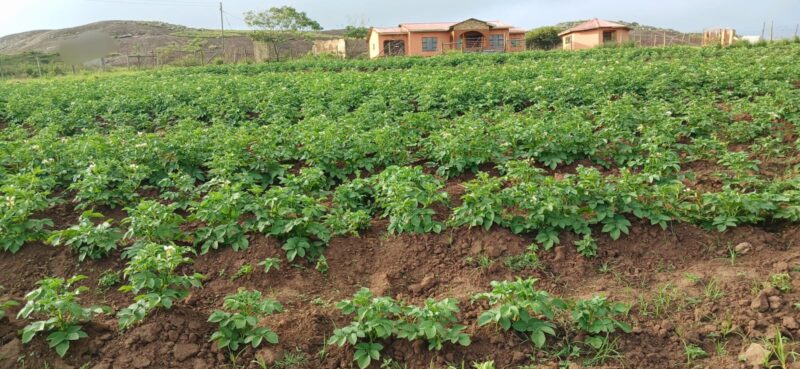
Running a co-operative, Jiya admits, comes with its challenges. Yet each member carries specific responsibilities that keep the business moving forward:
- Yonela Khonjwayo, the treasurer, manages sales, procurement, and ensures compliance with SARS and CIPC returns.
- Silindokuhle Ntsalu leads marketing and sales, building both their online presence and local reach.
- Baxolele Mcalata, who lives with a disability, oversees customer service and makes sure every client feels valued, whether big or small.
- Funeka Ntiyonke serves as secretary, keeping records in order.
- Novoti Jiya, as chief executive officer, ensures that everyone plays their part and that the co-operative remains on track.
Aiming high with limited resources
Despite their progress, Jiya says the business is still limited by resources. She tells Food For Mzansi that the co-operative has been surviving through crop rotation each year. They currently farm on five gardens of one hectare each, along with a 1.5-hectare field. These plots are fenced, but the old fencing is worn out and needs to be replaced.
“Livestock, especially goats, still manage to get through and destroy the crops,” she says. Water is another challenge. Without an irrigation system, they remain at the mercy of rainfall.
Transport also poses difficulties. For now, the farm remains small-scale, relying on traditional methods like digging holes for planting. “During harvest season, it is expensive because I have to hire cars to deliver produce to customers in different places,” Jiya says.
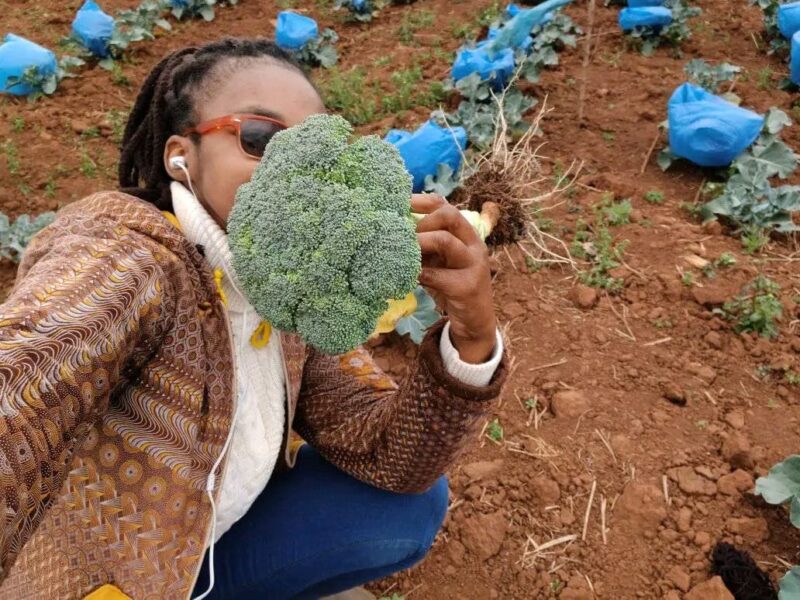
Even so, the business survives mainly through informal markets, with local street vendors being their biggest buyers. Schools in Dutywa and kuGatyane have also supported them by buying in bulk, which has helped keep the co-op afloat.
Looking ahead, Jiya is clear about her vision. One of Taleni Farmers Co-operative’s main missions is to create jobs for young people while supplying their communities with affordable and healthy vegetables.
“The aim of the co-operative is to bring young people together so we can fight unemployment, grow fresh vegetables to nourish our people, and at the same time make a living from it,” she says.
READ NEXT: How to bridge the ‘missing middle’ in agri-finance



